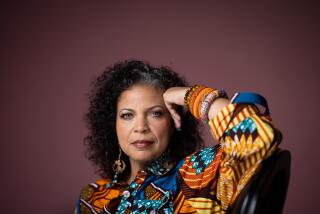Virna Canson, 81; Activist, Director of NAACP’s 9-State Western Region
- Share via
Virna Canson, director of the NAACP’s nine-state Western region from 1974 to 1988, who spent close to 50 years as an equal-rights advocate and grass-roots activist, died April 14 of cancer at home in Sacramento. She was 81.
She was born in Bridgeport, Okla., the older of two children and the daughter of two schoolteachers. She moved to Sacramento after she married Clarence Canson in 1940.
As a young wife and mother in 1954, she and her husband, who had recently graduated from law school, were turned down for a housing loan in the Oak Park area of Sacramento.
That year she went to work as treasurer and manager of the local NAACP credit union, hoping to make housing and other loans more readily available to minorities. She built the credit union assets from $35,000 to $400,000 during her years there.
At the same time, Canson helped NAACP lawyers prepare lawsuits that challenged the Federal Housing Administration and the Sacramento Public Housing Authority over discriminatory policies. She located plaintiffs and saw them through the filing of complaints. Several housing projects in the Sacramento area changed their policies as a result.
During the early 1950s, Canson helped organize a biannual NAACP summit in Sacramento. After one such gathering, NAACP members pushed for a state commission to investigate racially motivated acts of violence. The division investigating those hate crimes was established as part of the state attorney general’s office in 1954.
In the early 1960s Canson opened an NAACP lobbying center in an Odd Fellows building in Sacramento. In 1964, the group worked against Proposition 14, which would have overturned the Rumford Fair Housing Act. The measure was passed into law but overturned by the California Supreme Court.
“Virna was out to fight for justice,” said Willis Edwards, who sits on the national board of directors of the NAACP. “She was always trying to get people to volunteer their time to fight for justice with her.”
He met Canson in the 1970s when she was regional director of the NAACP. Part of her job was to train new managers of branch offices in her region. “She was a people person who set a standard of excellence for the presidents of those branch offices,” Edwards said.
After the Watts riots in Los Angeles in 1965, Carson worked for the state as a consumer education and credit union specialist for a new Watts service center. It was considered a pilot program, but Canson lobbied community activists to expand it. She helped several of them write proposals for credit unions in low-income areas. Twenty-eight offices were eventually added, from San Francisco to Riverside County.
In 1969 Canson returned to full-time work for the NAACP as a lobbyist specializing in legislation to protect low-income families. That led her to be named regional director, where she pushed hard on affirmative action issues and helped launch a national “Academic Olympics” for African American grade school and high school students.
She also took on a project to organize office correspondence, internal memos, financial statements and other material into an archive on the NAACP that dated to the early 1940s. She donated it to UC Berkeley’s Bancroft Library in 1978. In 1984 the library added Canson’s life story to its oral history archive.
Canson is survived by her daughter, Faythe; her son, Clarence; two grandchildren; and a brother. Her husband died in 1989.
The memorial service is Tuesday at 1 P.M. at Faith Community United Church of Christ, Congregational, 7486 Center Parkway, Sacramento.
More to Read
Sign up for Essential California
The most important California stories and recommendations in your inbox every morning.
You may occasionally receive promotional content from the Los Angeles Times.













